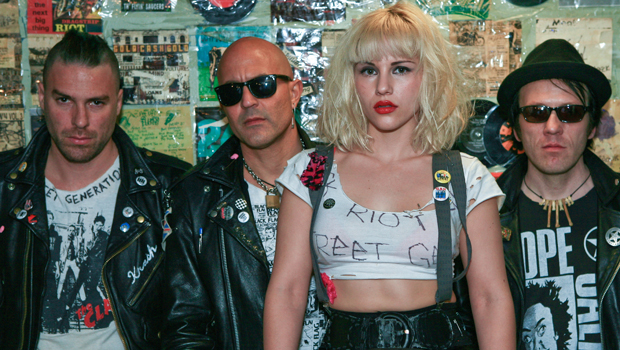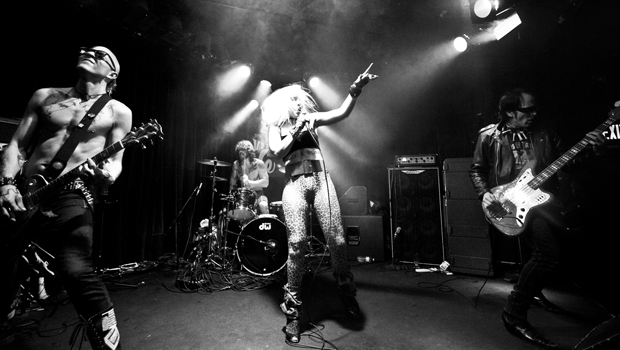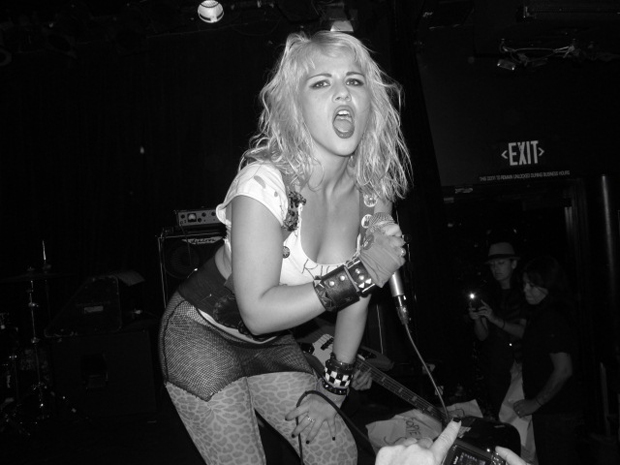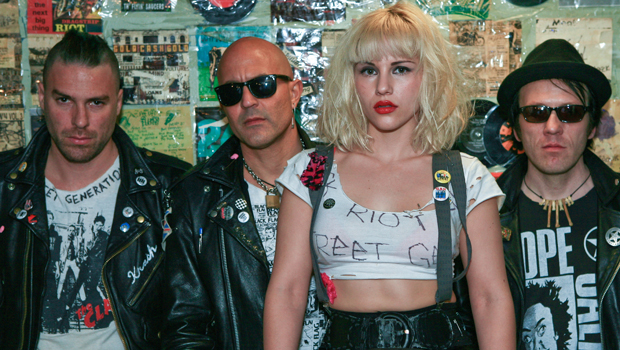Interview: Barb Wire Dolls Guitarist Pyn Doll on the Return of Punk

It’s often said that the music industry works in cycles, that everything old becomes new again, and that (fill in your favorite cliche here).
In fact, 2012 is lining up to be the year classic becomes contemporary, as legendary bands release blistering new albums, artists from previous decades tour to capacity crowds, and punk rock — 30 years old and sometimes thought of as a thing of the past — rears its furious, distorted head again like a shot heard around the world.
Barb Wire Dolls is a four-piece, true-to-the-genre punk band that features vocalist Isis Queen, guitarist Pyn Doll, bassist Voodoo Doll and drummer Krash Doll. The group came together in 2008 while living in the Ikarus Artist Commune in Avdou, Crete. Their debut EP, Punk the Fussies!, was released in 2010.
Headlining club dates and playing music festivals in Greece got the word out, and within a year’s time, the band sold everything they owned and relocated to Los Angeles. Legendary manager and A&R mogul Tom Zutaut — the man behind Guns N’ Roses, Motley Crue, Metallica and many others — saw them perform at the Viper Room and signed them to a management contract. The Dolls began touring the U.S., released two more albums and are back on the road for more dates, with plans to track again for a fall release.
Pyn Doll recently offered his perspective about the original punk movement and why Barb Wire Dolls are connecting with audiences worldwide.
GUITAR WORLD: Had you been in many bands prior to Barb Wire Dolls, and if so, how were they similar or different in sound and direction?
I played in lots of bands, from hardcore punk to you name it. They all were guitar-driven bands, though. Everything led up to Barb Wire Dolls, and this band is so full of an electric energy live that I feel like the room is going to explode at every show. It's like my whole life explodes into action, with all my past, present and future happening all at once when we are onstage.
Get The Pick Newsletter
All the latest guitar news, interviews, lessons, reviews, deals and more, direct to your inbox!
Most people don’t think of Greece when they think of rock and roll. Was it difficult to find musicians who shared your vision about forming a punk band?
There are punks everywhere, even on the little island of Crete, but sometimes the mainstream wants to keep you down. Way down. So after finding the right musicians to play live with, the next hurdle appeared: no club would book us because they didn't want anything to do with punk rock. We had to go to the big capital city of Greece — Athens — to get the opportunity to play live.
The punk movement took place more than 30 years ago. Which elements of that sound do you bring to your music? Do you feel that you stay true to the original form or do you incorporate more contemporary touches to your songwriting and recordings?
I was there for the punk movement when it first started. I started my first band in 1977, and though I loved Led Zeppelin and AC/DC, as soon as I heard the Sex Pistols, it was all over. I was a li’l skate-surf punk full-on raging to punk music and I never looked back. I was blown away by the first wave of punk, like the Stooges, Ramones, Pistols, Clash and Germs. I feel what I write is out of a necessity to get my pain out. Every time I see a video of the Pistols, I am in awe thinking of what they did back then. They have inspired me more than any band could ever get close to. There never will be a band to come close to what the Sex Pistols did. Having Steve Jones [Sex Pistols guitarist], my "guitar hero," stop by a show of ours in L.A. was a highlight of my life, and opening for Iggy Pop of the Stooges was another.
Your first concert here was sold out. Did you have any idea that punk music would be in such demand again?
We didn't know how much people had missed punk music until we started playing and the press caught on. Everyone seemed to be into the softer "indie" scene with all their wimpy keyboards, nonexistent distortion, and boring, boring, boring, lame shows, but things can change fast when you turn up the volume loud enough. There is nothing like a good, loud, chaotic, energizing punk show to get your blood pumping with a passion for living on the edge. It's time to destroy all the shoegazing bands and bring back rock and roll to the people.
What do you think has been missing in contemporary rock and roll that enabled a band like Barb Wire Dolls to break through in such a big way, not only in the U.S. but also worldwide?
The business suits that run the major record labels today have tried to force-feed crap to the public and they also forgot one thing: people are not stupid. They might be fooled for a while, but everywhere you look, people are waking up, from Occupy to riots in the streets. The music of a current culture has to reflect that, and punk music was made for that. I don't want to be told nonstop by some fat cat in a suit that the new Jay Z record is "da bomb!" I want to make my own mind up, and so do others, so there need to be options for people to make choices of their own. Music is life, and if you are living it, you will find the music to reflect how you feel. We are angry with the political and social state of this world and we want to scream about it. Maybe a few will wake up out of zombiehood and come to their senses. We are one of the many bands ready to start a riot anywhere, anytime.
When did you first begin playing guitar?
I was a classically trained pianist as a pre-teen and even got the honor of playing on Chopin's piano in Poland back then. I picked up the guitar as soon as I heard Led Zeppelin. There was no turning back. My guitar is my body.
Are you self-taught?
I had two lessons and both teachers told me I was playing totally wrong. I still can't play anything technical, but to me, it's all about the rhythm and feeling. I am blown away by Jimi Hendrix, Jimmy Page and Angus Young, but I have no talent for that. I like Steve Jones, Johnny Thunders [New York Dolls], Pat Smear [The Germs], Mick Jones and Joe Strummer [The Clash] and Johnny Ramone. Those guys are true heroes to me because they made music that matters without being given a magical technical talent, and they all destroyed the misconceptions that punk is not worthy of "legend" status and respect.
Did your approach to the instrument change much when you started this band?
No. I always play the same. Three chords, no solos, no pedals, and always downstroking. Always loud and always distortion. I couldn't play a real solo to save my life and I love it that way!
As the band’s principal songwriter, do you arrange all of the parts? How does the process work? Do you also write the melodies?
“I write the songs,” like Barry Manilow once sang ... . It's my honor to do that and my pleasure. Everyone does their own part after that.
What is the guitarist’s role in Barb Wire Dolls?
To blow out the eardrums of those that get too close to our singer.
Have you always played in single-guitar bands? Is that a preference for you?
I always loved single-guitar bands except for The Clash. Mick and Joe had a real magic together there. I like the dynamics of a four-piece with one guitar and a singer who can run around free and not be constrained by an instrument. Keep it simple, keep it raw, and keep it easy to play is how I prefer it.
Pyn Doll’s Gear Rundown:
Guitars: (1) '70s Gibson Les Paul Standard Gold Top
Pickups: “No idea, whatever it came with back then.”
Amps and cabs: (1) Marshall JCM 900 and (2) slant 4x4 cabs
Pedals and effects: “Never had 'em, never will.”
— Alison Richter
Alison Richter interviews artists, producers, engineers and other music industry professionals for print and online publications. Read more of her interviews right here.



Alison Richter is a seasoned journalist who interviews musicians, producers, engineers, and other industry professionals, and covers mental health issues for GuitarWorld.com. Writing credits include a wide range of publications, including GuitarWorld.com, MusicRadar.com, Bass Player, TNAG Connoisseur, Reverb, Music Industry News, Acoustic, Drummer, Guitar.com, Gearphoria, She Shreds, Guitar Girl, and Collectible Guitar.
“His songs are timeless, you can’t tell if they were written in the 1400s or now”: Michael Hurley, guitarist and singer/songwriter known as the ‘Godfather of freak folk,’ dies at 83
“The future is pretty bright”: Norman's Rare Guitars has unearthed another future blues great – and the 15-year-old guitar star has already jammed with Michael Lemmo









